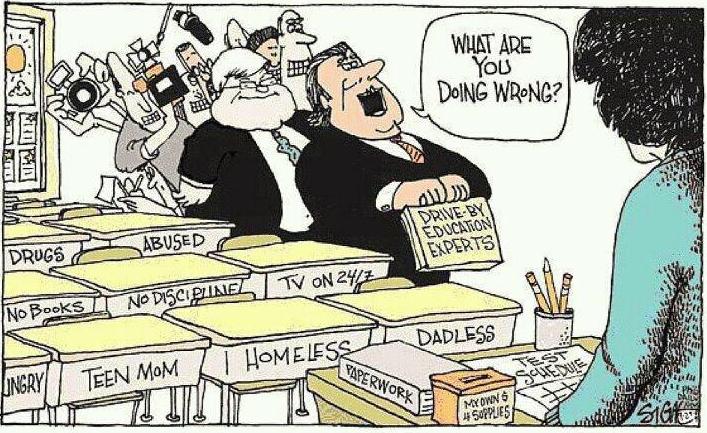Since the spark of President Bush’s No Child Left Behind act back in the early 2000s, education has changed its course from a cultivating character development environment to a data driven setting. The standards for teacher led instructions, prompting teacher accountability, have dominated the political discourse in the United States. The overall concept adheres to three common principles. The first holds to improve the national academic structure and rigor for required student learning. The second focuses on the analytics and tracking for student growth. And, lastly, the third draws on a strong attention to the teacher’s tactics and delivery for both student engagement and academic success. While the overall principles provide a positive underlying notion of the nation’s feelings on the importance of education, many educators and professionals within the academic field are now questioning whether these tactics are helping our youth or hindering their abilities.
As stated before, from the first glance, these three principles seem relatively logical and well intentioned for the improvement of a better system. However, like any perfect plan, there will be flaws. The biggest and most glaring flaw is the simple idea that these principles and standards have set unrealistic expectations for both teachers and students alike. While we, of course, want our teachers providing the best set of instructions to educate our future leaders of tomorrow, the mismanaged and antiquated concepts of updating this system seem to dictate that we follow the “one size fits all” model of change. Take for example a sixth grade middle school student who is two grade levels behind. How will they cope with a more rigorous standard if they do not even have the simple foundation for reading, writing, and analytical thinking? On the flip-side, how can a teacher cope with these distinct levels if they are set to instruct at a higher or more rigorous level?
Because of these new changes, teachers have been put on the hot-seat countless times for not performing and executing within the classroom. The concepts of ‘data’ and ‘tracking’ have simply taken the art and essence of what is to be a teacher and have now culminated into a corporate factory. This problem has even escalated in which teacher retention rates have continued to decrease year after year where reportedly more than 50% of new educators are said to leave the classroom before their five-year mark. With this type of fluctuation within the classroom and lack of consistency, we need to start thinking of the negative affects this will have on our childrens’ futures.
So, who is to blame for our roller coaster education system? Can we truly put the initial blame on the educators who work sun-up to sundown for our children when we ask them to change their entire style and system of teaching so that it can adhere to a more aesthetically pleasing practice? Or should we blame those “higher-ups” who are trying to make a difference but are so removed from the trenches that they will not listen to the majority of teachers who say this new system needs both tweaking and time? The answer? Neither. However, one is certainly getting blamed over the other.
In the education sector, teachers are held accountable to provide quality programs and welcome accountable lessons that are strategic, effective, and achievable in producing results. This is called teacher accountability. While I unequivocally agree that teachers must take responsibility for their students’ achievements, we also need to be aware that there are other external factors at play. At times, teachers do not have any control of their resources or curriculum content. In addition, the external factors impacting student growth such as their community or home lives also play in how challenging a situation can be for a student. This burden is amplified through local media and national political agendas that end up distorting the real problems of poverty, community, and money by putting the sole blame on the teacher. How much time a teacher has with a student is proportionately minuscule compared to a parents, but significant enough that it does warrant focus
I believe that the American public should stop using educators as the scapegoat for the real problems going on within education. These problems go beyond that of the classroom and that of the standards. Some people will scoff at the Mrs. Smiths or Mr. Potters of the teaching world who took a ‘back-seat’ textbook approach to teaching. While there are some individuals within the education practice who have done this, we cannot generalize that every single teacher is doing that. This push for ‘accountability’ is simply to asking teachers to put in the needed effort to educate our children, when in reality, they are. We are creating doctors, lawyers, and future CEOs. We are cultivating the minds of a future generation. And last but not least, we, teachers every one of us, are inspiring the passion and love for learning.
To alleviate this problem, what we as a nation need to do is to move away from the blame game and look at the impacting problems educators go through each and every day with their students. These problems cannot be solved simply with a new agenda or a new representative. Rather, it needs dedicated and invested individuals have the will to make the impossible dream a reality. The problems in one district or school can be the polar opposite of their neighbors. Individualized plans need to be supported and addressed. The one-size-fits-all mechanic will not work. At the end of the day, the art of the teacher is to create, develop, and inspire the ingenuity and passion for creative teaching. Let’s address where we can see the style that produces that growth in every single classroom by going to that district and addressing the environment specific issues they have with the support they need.

